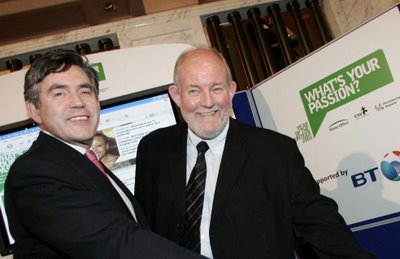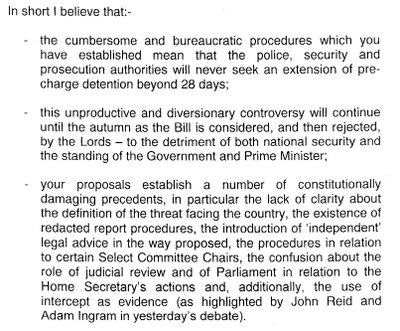Another week in the slow death of Gordon Brown.
I write this not as a contrast to Brown's current position, but because it would be utter lunacy, only a year away from an election and during a recession for Brown to be overthrown, as there are again mutterings of, mostly from the Blairite-sympathisers who have been secretly praying for Brown to epically fail since he took over. At the same time however, Blair never looked as weak as Brown currently does. Blair would never have lost on an opposition motion as the government did on the Gurkhas this week, because he was both too ruthless and too in control. Despite all the claims of Brown's tactics following the McBride affair, the man accused on a number of occasions as being a control freak seems to have lost his party, or rather, the party has lost him. The blame must ultimately lie at the top, but surely all those involved could see just how unpopular the Gurkha policy was? David Blunkett, wrong on many things repeatedly, including today, is surely right when he says the party has lost its political antennae. It's almost as if the entire policy was left in the incapable hands of the likes of Phil Woolas, who only has one thought in his head, and that's to say no to everyone with brown skin, regardless of the circumstances involved.
This not knowing when to say hang on, we're doing something terribly wrong here does however extend right to the top. Who knows quite what was going through the heads of all who were involved in the making of Brown's YouTube video, but the thinking behind it was positively neanderthal. One part was attempting to change the story from the McBride emails onto the other hot button topic of MPs expenses, but the other was simple and crude political calculation, trying to outwit both the Conservatives and Lib Dems, which deserved to backfire spectacularly. More pertinently, there should have been an adviser either at the filming or who watched it afterwards who had the nerve to tell the prime minister not to act like someone he's not: yes, we know that the stuff about you being a dour old Stalinist is tiresome and that you'd like to prove everybody wrong, but curling your face up randomly, looking as though you're about to burst out laughing and then turning immediately back to a position of the utmost seriousness as though someone's shoving a cattle prod up your rectum every few seconds while you're broaching such a topic is not going to do that, it's just going to make people laugh at you even more. It's not quite up there with "LEAVE BRITNEY ALONE" in the meltdown stakes, but it's not far off.
You could perhaps accept a taking of the eye off the ball if Brown genuinely was focusing on the economic situation, but that's evidently not the case. There is more than a hint of drift, of there being no apparent sense of direction, almost as if they are already resigned to their fate of losing the next election. This is not in the slightest bit helped by Charles Clarke, who like Frank Field increasingly seems to just be taking his anger out for past slights on the government at large. He professes to be "ashamed" to be a Labour MP, although he doesn't go into specifically why he suddenly feels this way, although presumably he's referring to either the Gurkha policy or "Smeargate". This of course is a man who was in the cabinet at the time of the Iraq war, and said nothing against it, which you might think is now something much more worthy of being ashamed about. This is a man who was home secretary while Blair was attempting to smash 90 days detention without charge for "terrorist suspects" through the Commons. This was a man who was there when Dr David Kelly was smeared and attacked, a far more shameful episode than the recent emails which were never sent and never used but which has been forgotten by those who can't remember what happened more than two weeks ago, all of which he said nothing about or actively supported.
Even if Charles Clarke is one-trick pony, much like the other Blairites who either suffer in silence or who brief the media with how desperately unhappy they are about the way things are going, the truth is that the Labour party has been reduced to its current state because of the way it has been controlled from the top, and because of the way in which the Blairites themselves operated for so long. Any dissent or deviance was considered to be heresy, and only those who had long been regarded as loose cannons, such as the Campaign and Tribune groups, were left to plow their own increasingly lonely furrows. The end result could have been predicted: a party reduced to a husk, where there is no apparent successor to the TB-GB years, and where there are either no policies or policies which cannot possibly be allowed to happen because they're too Old Labour. When the most likely leadership candidates are Harriet Harman, admirable on some counts but deeply unattractive on others, David Miliband, who is simply too inexperienced and a soft Blairite, and Alan Johnson, whose main attribute appears to be that he's solidly working class and has good relations with the unions, it's not difficult to imagine that Labour will easily be out of power and in flux for around the same amount of time as the Tories have been.
Critically, this has left the Conservatives with next to no challenge, even when they still haven't properly sealed the deal with the electorate. Things are going to be grim whoever wins the next election, but the talk of an age of austerity, which has come so naturally to the lips of David Cameron, chills rather than raises hopes. It leaves the impression that if Labour wants to turn the clock back to the 70s, as we are led to believe, the Conservatives wish to return to the 50s. Of the two decades, it's not difficult to make a choice as to which would be preferable. Labour doesn't deserve to win the election, and it shouldn't, but neither do the Conservatives. That we are effectively disenfranchised if we want a pox on both their houses is just as damaging to our democracy as parliamentary expenses have turned out to be.
Labels: Blairites, Charles Clarke, fall of Gordon Brown, Gordon Brown, gurkhas, New Labour, politics





